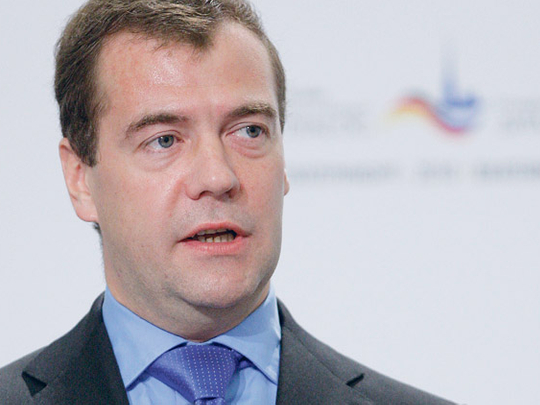
Yekaterinburg, Russia: Russian President Dmitry Medvedev ratcheted up the pressure on Iran Thursday, urging it to explain the "military components" of its nuclear programme.
Russia has fostered lucrative trade ties with the Islamic Republic over the past two decades but the Kremlin under Medvedev has struck a distinctly worried tone about the potential threat from a nuclear-armed Iran.
"I would like to say that Iran is our rather active trading partner and has been tested by time, but that does not mean we are indifferent to the way Iran is developing its nuclear programme and we are not indifferent to how the military components of the corresponding programme look," Medvedev said.
"In this respect, we are waiting for the appropriate explanations from Iran," he said at a news conference with German Chancellor Angela Merkel in the Urals city of Yekaterinburg.
US President Barack Obama has sought to win Kremlin support for a tougher line against Tehran, and in June Moscow supported further United Nations Security Council sanctions against Iran.
Western powers suspect Iran is trying to build a nuclear bomb, something it has repeatedly denied. Russian diplomats were insisting in public as late as last year that they had seen no evidence that Iran was seeking to make nuclear weapons.
But in a speech on Monday, Medvedev for the first time warned that Iran was moving closer to getting such weapons, the frankest assessment from a Kremlin chief in at least a decade about the alleged threat from Iran's nuclear programme.
"Russia is being even more forthright with its concerns about the Iranian nuclear programme, although I don't know if there was any particular piece of information that caused this," said one Western diplomat who asked not to be identified.
Ballistic missile
Since 2005, the United Nations nuclear watchdog has been probing Western intelligence reports indicating that Iran has coordinated efforts to process uranium, test explosives at high altitude and revamp a ballistic missile to make it suitable for a nuclear warhead.
Iran says its nuclear programme is peaceful and aimed solely at generating electricity, and that Western powers are using false intelligence reports to manipulate the UN watchdog.
Medvedev, who was sworn in as Russian president in May 2008, said both open sources and reports from secret services showed that Iran was developing its military nuclear programme.
"Iran must find the courage to start fully fledged cooperation with the international community," Medvedev said.
Prime Minister Vladimir Putin, Russia's most powerful politician and the ultimate arbiter on major policy decisions, rarely comments on Iran, though he warned last year against intimidating Tehran.
Diplomats said Moscow has proven adept at sending mixed signals on the issue.
Iranian Foreign Minister Manouchehr Mottaki said that talks between his country and the world powers on a plan to supply fuel for a Tehran nuclear reactor should start around late September.
Iran has said it is ready for negotiations with the five veto-holding members of the United Nations Security Council plus Germany on a deal brokered by Turkey and Brazil in May. It proposed supplying enriched uranium in a form usable in the medical-research reactor in exchange for part of Iran's supply of the material that has yet to be transformed into fuel.
"Turkey and Brazil still adopt the same stance and we welcome their presence in talks," Mottaki said today at a Tehran news conference aired live by state-run Press TV. The two countries "will see that the negotiations be held in the proper way," he said.
The five Security Council members and Germany have pressed Iran to agree to talks on its nuclear program since the council voted to impose a fourth round of UN sanctions last month. The US and the European Union subsequently imposed their own restrictions on Iran.
Mottaki said on July 12 that the world powers had agreed to let Turkey and Brazil participate in the talks, according to Press TV. Western nations last month rejected the plan for a fuel swap because Iran vowed to continue enriching uranium after it receives a supply of the material in a form needed to run the reactor.
The facility makes isotopes for medical uses such as X- rays and radiation therapy.












